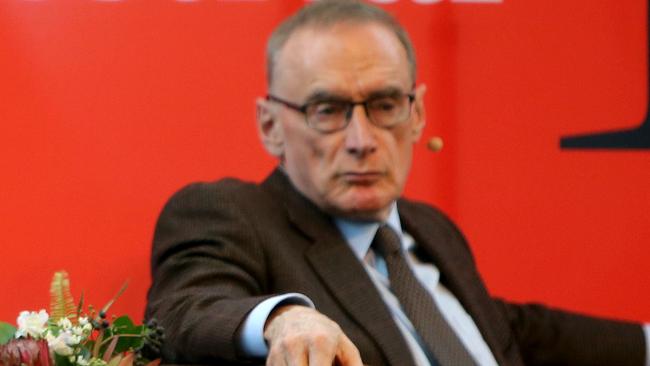Bob Carr’s think tank ‘operating as a China propaganda arm’
Bob Carr’s China think tank is operating as a ‘propaganda arm’ of the Chinese communist government, critics say.

Bob Carr’s China think tank at the University of Technology, Sydney, is operating as a “propaganda arm” of the Chinese communist government, critics say, as they raise concerns that the Australian university sector is compromising academic freedoms and has become an easy target for Chinese “soft power”.
The Australia China Relations Institute at UTS was established in 2014 with a $1.8 million donation from property developer Huang Xiangmo, whose Yuhu Group also settled a $40,000 legal claim for Labor senator Sam Dastyari.
The NSW senator resigned his frontbench role on Wednesday amid ongoing revelations about his links to Chinese donors.
Following Senator Dastyari’s resignation, one senior Labor source told The Australian Labor’s former foreign minister was responsible for pushing an aggressive pro-China position with Labor MPs in NSW, particularly within the party’s Right faction: “Sam was just the monkey — the organ-grinder is Bob Carr.”
The former foreign minister’s think tank for Australia-China relations at UTS says its research is based on “a positive and optimistic view” of the bilateral relationship and claims to be “independent” and “non-partisan”.
Mr Huang, whose company has formal ties to the Chinese government, recently said he personally appointed Mr Carr as the institute’s director. He has also been made chairman of ACRI.
The Australian can reveal that, before ACRI was established, the university had faced problems with the Chinese government after it included references to Falun Gong religious artwork displayed in a student-union exhibition on its website. Falun Gong is a spiritual practice banned in China since the late 1990s; its followers are widely persecuted.
Sources say the university received a formal request from Chinese government officials in Australia to remove the artwork, and made their displeasure known. Soon after the incident, the UTS website was blocked in China, meaning it was unavailable to potential international students, cutting off an important income stream.
There are competing views about why this occurred, with two academics familiar with the ban telling The Australian it was “punishment” for its unwillingness to restrict academic freedom, while another said there had never been any indication of a link between the two and they believed it was related to a commercial entity in China wanting to take over the university’s website address.
The website blockage first occurred in 2005. A spokesman for UTS said: “The university was not aware of any specific reason for this, and received no communication from China relating to it. Any suggestion as to its cause is pure speculation.”
Swinburne University’s John Fitzgerald, a China expert who is a former director of the Ford Foundation in Beijing, said in the past decade China had extended its reach and influence into Australia’s education institutions.
He said while there may only be a “sequential link” between the university being black-banned and the new institute, the message was “crystal clear”.
“The creation of a China centre committed to spinning positive stories about China at a university previously punished for non-compliance sends a clear message to the sector, and to China that impartial academic research based on free and open critical inquiry is not necessary, perhaps even not wise, for a university planning to deepen its engagements with China,” Professor Fitzgerald said.
“Universities and research institutes in China would love to practise the kind of free and open critical inquiry we take for granted in the humanities and social sciences in Australia. ”
Another prominent Australian China academic who did not want to be named said the UTS institute was “too close” to the Chinese embassy and was operating as a “propaganda arm” for the Chinese Communist Party.
The academic raised concern that publications from ACRI were being used to support propaganda being distributed by the Chinese government, particularly about the state of its economy. UTS deputy vice-chancellor for research Glenn Wightwick defended accepting private money for the institute and said the centre had a “fully independent, academically rigorous and transparent research agenda”.
“UTS has (supported), and always will support, academic freedom and the obligation of its academics to speak out on public issues related to their fields of expertise, whether that be in science, economics or public policy,” Professor Wightwick said.
Another Australian China expert said many Australian universities had institutes similar to UTS that were compromising academic freedom of expression to try to lure Chinese money.
He said Mr Carr’s institute had done some good work, but ACRI was wrongly presented as an independent academic institution, when it was clearly biased.
Mr Carr did not respond to arequest for comment.


